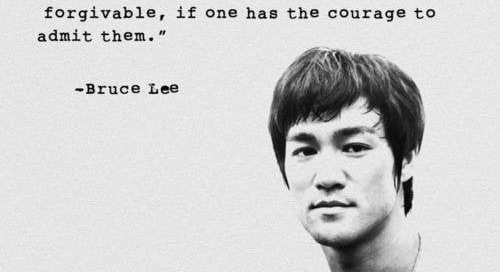This yearlong weekly journey is designed to help you break free from what I call the porn prison - a state of mental, emotional, and spiritual confinement caused by porn consumption. This prison traps individuals in cycles of shame, isolation, and disconnection, making it difficult to live a life of purpose and fulfillment.
Each Friday for the full year of 2025, I’ll dive into a key aspect of recovery, provide practical tools, and challenge you to take meaningful steps toward lasting freedom. Whether you’re just starting your journey or already working toward healing, this series offers encouragement, clarity, and structure to help you build and sustain a new, liberated identity.
The Power of a Sincere Apology and Repentant Identity
For more than 20 years, I was terrible at apologizing. Every relationship it seems like in hindsight whether romantic, family, or friendship → suffered from my inability to own my mistakes. Apologies felt like a burden, a moment where I had to admit I wasn’t perfect and brace for whatever consequences followed. It’s not that I didn’t know that I needed to say sorry and that I did something wrong, it was more of not understanding the full purpose and power behind genuine remorse and repentance.
Because there was no real accountability in my life with my porn consumption, I learned to avoid apologizing altogether when it’s negative effects impacted others. Instead of addressing my wrongs, I minimized, deflected, or justified them. I wasn’t trying to be cruel, I was just afraid and incompetent. Afraid of losing relationships, afraid of judgment, afraid of feeling exposed, afraid of making mistakes, afraid of fear itself.
Looking back, I see how much harm this caused. I left wounds unhealed, let trust erode, and reinforced patterns that kept me from real change. It wasn’t until I started my journey of recovery and invested my time in deep self-work that I realized: a sincere apology isn’t just about making peace with someone else, it’s about aligning my actions with the person I want to become by living honestly and taking the next best action.
Why This Matters
Recovery isn’t just about quitting a behavior, it’s about rebuilding trust and restoring relationships. Addiction, particularly to pornography, often breeds secrecy, dishonesty, and emotional distance. A sincere apology is a necessary step in repairing the damage, but it has to be done with intentionality.
At the same time, repentance isn’t just about feeling bad for what you’ve done, it’s about committing to a different way of living. This week, we’ll explore how to apologize sincerely and how to develop a repentant identity that moves beyond guilt and into transformation.
What an actual sincere apology should look like after a relapse
A real apology isn’t about making yourself feel better or begrudgingly mouthing an apology, it’s about taking responsibility and making things right. Here’s a framework for an apology that leads to healing:
The 4 R’s of a Sincere Apology
Recognition – Clearly acknowledge what you did wrong, with no excuses.
❌ “I’m sorry if I hurt you.” (Weak & vague)
❌ “I guess I messed up, but it wasn’t that bad.” (Minimizing)
❌ “I wouldn’t have done that if you hadn’t…” (Blaming)
✅ “I’m sorry for breaking your trust by lying about my porn use.”
✅ “I recognize that my actions caused you pain and disappointment.”
✅ “I have not been honest with you and I take responsibility for that”
Remorse – Express true regret without self-justification.
❌ “I didn’t mean to, but…” (Excuse-making)
❌ “I said I’m sorry, isn’t that enough?” (Defensive & dismissive)
❌ “I just felt really stressed, so that’s why I did it.” (Shifting blame)
✅ “I can see how my actions hurt you, and I feel deep sorrow for it.”
✅ “I feel genuine regret for the way I acted, and I take full responsibility.”
✅ “I deeply regret the pain I caused and wish I had made a better decision, I acted selfishly.”
Restitution – Ask how you can make it right.
❌ “I said I’m sorry, let’s just move on.” (Dismissive)
❌ “What else do you want from me?” (Resentful & unwilling to repair)
❌ “Well, I guess I’ll try to do better, but no promises.” (Noncommittal)
✅ “I want to rebuild your trust—what would help you feel safe again?”
✅ “What can I do to repair the damage I’ve done?”
✅ “I understand that trust takes time, and I am willing to do what it takes to earn it back.”
Reformation – Show (not just say) that you’re committed to lasting change.
❌ “I promise I’ll never do it again.” (Empty promise without action)
❌ “I said sorry, so you should trust me now.” (Entitled)
❌ “I’ll stop for a while, but I can’t guarantee anything.” (Lack of commitment)
✅ “I’ve installed accountability software and joined a group to stay committed.”
✅ “I’ve committed to daily check-ins with an accountability partner.”
✅ “I am actively working on healthier coping strategies so I don’t repeat this mistake.”
How to develop a Repentant Identity
Many people confuse guilt with repentance. Guilt says, “I’m a terrible person.” Repentance says, “I was on the wrong path, but I’m turning around.” True repentance leads to transformation, not just momentary regret.
Signs of True Repentance
Keep reading with a 7-day free trial
Subscribe to Porn Free Millennial to keep reading this post and get 7 days of free access to the full post archives.






![Mistakes are always forgivable..." - Bruce Lee [500 x 353] : r/QuotesPorn Mistakes are always forgivable..." - Bruce Lee [500 x 353] : r/QuotesPorn](https://substackcdn.com/image/fetch/w_1456,c_limit,f_auto,q_auto:good,fl_progressive:steep/https%3A%2F%2Fsubstack-post-media.s3.amazonaws.com%2Fpublic%2Fimages%2Fa37c5d4c-dd44-4dac-a3c9-70da3fe6cd45_500x353.jpeg)